What Is a Business Owner’s Policy (BOP)?

Last Updated: By TRUiC Team
Acquiring proper insurance coverage is one of the most important things to do early in a company’s life cycle. However, it can also be a source of stress and confusion, as entrepreneurs try to navigate the policies they need to purchase.
If you’re starting your own business, you may be wondering what a business owner’s policy (BOP) is, who should acquire one, and how it compares to other types of insurance. This article will explore the details of BOPs so that you can make an informed decision on whether or not you need to invest in one for your business.
What Is a Business Owner’s Policy?
A business owner’s policy includes commercial property insurance and general liability insurance in a single package. Purchasing this type of policy creates a solid foundation of coverage and protects your company in the following ways:
- General Liability Insurance: This insurance policy covers some of the most common claims faced by companies across a range of industries. These include third-party bodily injury, third-party property damage, advertising liability, libel, slander, and copyright issues.
- Commercial Property Insurance: This form of coverage gives you protection in the event of damage caused by natural disasters, fires, burst pipes, and other perils. In addition to your building, commercial property insurance covers your signage, furnishings, equipment, inventory, fencing, landscaping, and any third-party assets located on your property.
Who Can Acquire a Business Owner’s Policy?
With most insurance providers, a business owner’s policy is only available to small businesses. Typically, this is defined as a company with fewer than 100 employees and annual revenue of no more than $5 million. There are often square-footage guidelines for BOPs as well. This usually imposes a limit of around 25,000 sq ft, but can vary quite a bit from provider to provider.
For mid-sized or large companies that don’t qualify for a BOP, there may still be bundled policies available in the form of commercial package policies (CPP). With a CPP, you can design a policy that’s specifically tailored to the risks faced by your business, including high-risk business activities.
For some small-business owners who engage in complex, dangerous, or unique business activities, a CPP is preferable to a BOP. However, for the vast majority of small businesses, a BOP is the better fit.
What Advantages Do Business Owner’s Policies Have?
The main advantage of a business owner’s policy is the fact that you’ll save money over acquiring general liability insurance and commercial property insurance as separate policies.
In addition, bundling your insurance coverage under one policy is easier to manage and can simplify the process of adding additional coverages based on your unique business needs.
What Additional Coverage Can Be Added to a Business Owner’s Policy?
The most common coverage added to a business owner’s policy is business interruption insurance. This form of coverage helps soften the blow of lost revenue resulting from your business temporarily closing due to a covered peril. Most policies will allow you to add six months of lost revenue coverage to your BOP. Any more than that usually requires purchasing a separate business interruption policy.
Many businesses also like to acquire professional liability insurance, which is akin to a more specialized form of general liability coverage. With professional liability coverage, you’re protected from lawsuits related to your company’s field of expertise and line of business. Common claims include negligence, slander or libel, and copyright and trademark disputes.
Not all businesses need this type of coverage, but many specialized companies can benefit from its protections. This coverage can often be added to your business owner’s policy.
Crime insurance may be the most popular coverage added to a business owner’s policy. This part of a BOP protects your business from losses due to corporate crimes such as forgeries and alterations, computer fraud, funds transfer fraud, employee dishonesty, kidnap, ransom, and extortion, and counterfeiting.
Another common add-on is cyber liability coverage. This is an increasingly important form of coverage in the modern workplace where seemingly everything is connected to the internet. About two-thirds of all cyber attacks impact small to medium-sized businesses, making this coverage important for companies of all sizes. Cyber liability coverage takes care of legal fees, data recovery, identity restoration, and more in the face of cyber attacks.
Employment practices liability insurance (EPLI) is another potential add-on coverage for your BOP with some (but not all) insurance providers. This is a way to protect your business in the case of employee discrimination claims. EPLI coverage also protects your company in the face of wrongful termination allegations and harassment claims.
What Coverages Are NOT Part of a Business Owner’s Policy?
While different insurance providers will vary in which add-ons they allow you to include in a business owner’s policy, there are some types of coverage that can never be included.
Workers’ compensation insurance is one type of coverage that you cannot add to a business owner’s policy. This coverage is required by all states but Texas, and covers costs incurred due to employee injuries or illnesses that take place on the job. This policy must be purchased separately by any business with employees.
Similarly, commercial auto insurance cannot be added onto a business owner’s policy. If your business uses any motor vehicles, commercial auto insurance is essential to protect your vehicles and your employees in case of an accident. This will need to be purchased separately from your BOP.
When Should You Acquire a Business Owner’s Policy?
Most businesses should acquire their business owner’s policy before opening their doors. Operating your business without coverage for even a few days will leave you open to uncovered and potentially devastating claims.
Months or even years later, a claim from an uncovered period in your insurance life cycle could show up and severely damage your business. While some policies will seem expensive when you’re just starting out, the cost of remaining uninsured can be far greater.
Final Thoughts
A business owner’s policy (BOP) is a great way for small businesses to acquire much of the insurance coverage they need at a rate they can afford. In addition, a BOP is customizable based on your particular business needs, making it a great way to streamline a complicated, but critical aspect of your business planning.


